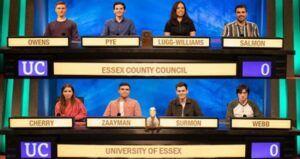Every year, our Analytics and Data Science team joins up with the University of Essex for our annual University Challenge Project. Despite what the name infers, this isn’t a remake of the popular TV quiz show hosted by Jeremy Paxman, although one could argue that both have the same general concept: students answering difficult questions.

The idea of the University Challenge is that ECC (Jeremy Paxman) comes up with questions that need answering in an area that aligns with organisational priorities. Six social science students are selected from the University of Essex who will spend part of their final year undertaking research projects that aim to tackle the questions, and produce valuable insight that will aid strategic decision making in the chosen area. A bit similar to the TV show, right?
We chose climate change as the topic for this year’s project. Specifically, we asked the following question: “How can we change behaviours of Essex residents towards climate change to help Essex become net-zero by 2050?”. With community engagement being one of the key areas of focus that the Essex Climate Action Commission identified within their Net-Zero: Making Essex Carbon Neutral report, there was ample opportunity for the students’ insight to inform action.
The project was kicked off with an Insight Day, where the students heard from key stakeholders within the Essex Climate Action Commission such as Commissioner Professor Jacqueline McGlade, Young Assembly and Youth Parliament member Prajwal Pandey, and Communications Officer Tom Yiangou. Alongside this, the students heard from teams in ECC's Chief Executive’s Office about how we use data to produce insight and inform policy. It was great to see knowledge and expertise being shared with each other and the students.
The students tackled the topic of community engagement from a variety of angles, from the role of emotion in communicating climate-related issues to residents, to how best to encourage residents to reduce their food waste and change their current energy providers to renewable energy sources. Here are some of their key findings:
Communicating climate change awareness to young people
- Video content, and particularly the use of TikTok, was found to be the most effective method of communicating and encouraging climate action in young people.
- Young people respond to climate action content more when they can relate to it, both geographically and temporally.
The role of emotion in climate communication strategies
- Instilling hope in messaging is a more effective method to evoke behaviour change towards climate change than instilling fear across multiple audiences.
- Communication strategies are more effective in encouraging behaviour change when they place an emphasis on the substantial steps needed to become net-zero, and they are even more effective when they are communicating these steps with hopefulness.
Encouraging residents to reduce food waste and compost
- The majority of survey respondents were found to be unaware of the consequences of wasting too much food.
- Those who do compost their food usually do not compost it properly. Support is needed to teach residents how to compost properly.
- Incentives such as small rewards are effective in getting more people to compost.
Persuading residents to change to using renewable energy resources
- Encouraging a “try before you buy” method is effective in increasing interest in changing to renewable energy resources.
- Targeting residents differently dependent on age, household income and local area is important to capture audiences.
- Getting money back for the energy that isn’t used is the most persuasive incentive for residents to change to renewable energy.
Evaluating Community Energy Initiatives
- Over 80% of respondents were willing to join a Community Energy Initiative in some capacity.
- Those with higher level education are much more likely to join a Community Energy Initiative than those without higher level qualifications.
- Relying less on big energy companies is a big motivator for residents to join a Community Energy Initiative, and the recent lifting of the energy price cap should be utilised in messaging to encourage people to join initiatives.
The students presented their findings to a large forum of colleagues from across ECC, many of whom are involved in the net-zero Essex agenda. Their passion for the topic, and novel insights, were well-received and generated a lot of thought-provoking conversation. Consequently, their findings are being used to inform the communications strategy for achieving a net-zero Essex by 2050. It was great to be a part of a long-standing collaboration that sets an inspiring example for how beneficial relationships with external organisations can be.
I said at the beginning of this blog that this project is similar to the University Challenge TV series in some ways. But with this being said, I’d argue that our University Challenge is better (sorry, Jeremy). The students get the opportunity to have some real impact on lives in Essex, and ECC benefit from innovative and refreshing insight. This year was no different, so if you’re an ECC colleague and wish to watch it on catch up, you can view a recording of the students’ final presentations via the insight portal. Otherwise, please do tune in for the next episode of Essex’s University Challenge in a year’s time.
Leave a comment